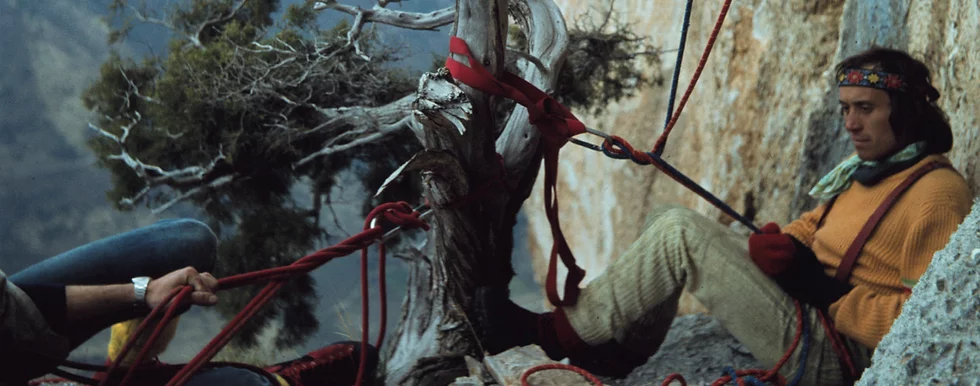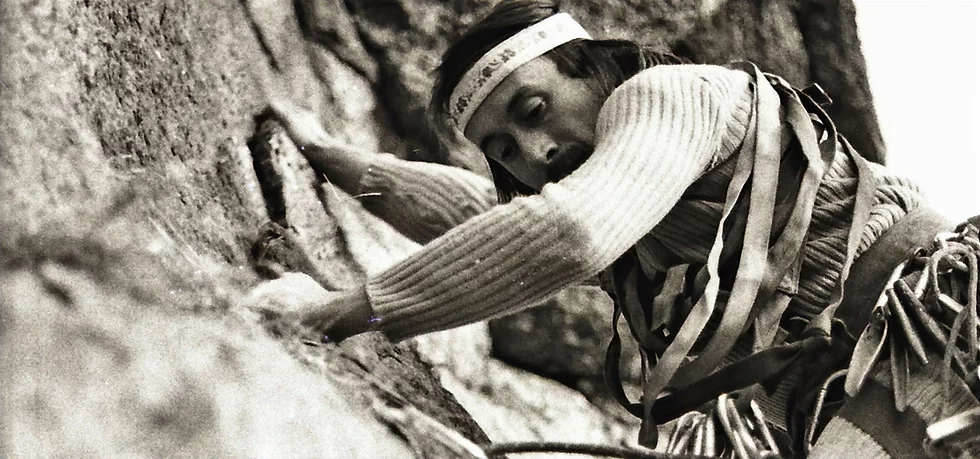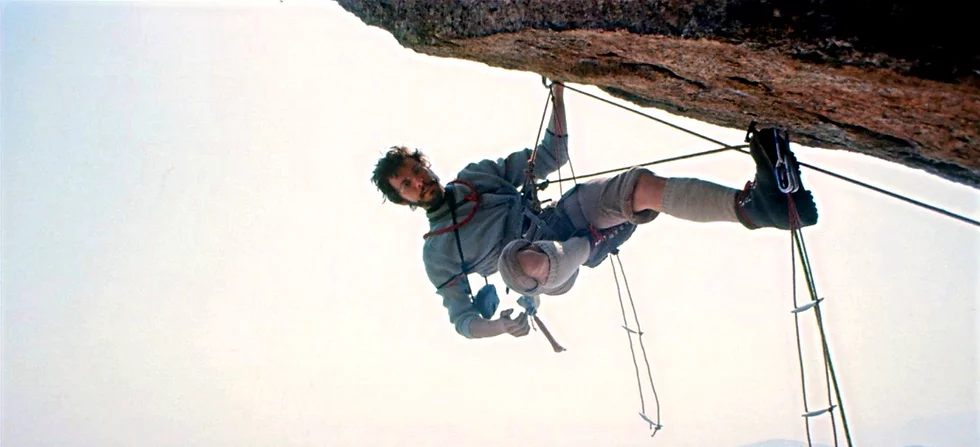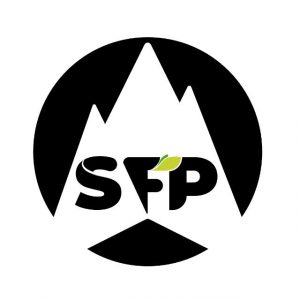
The “
Nuovo Mattino” represents a fundamental step in the evolution of mountaineering in Europe, ushering in a shift from a “Nationalistic” form of alpinism, characterized by the “summit conquest at all costs” mentality, to a more free, lightweight, playful approach based on the pursuit of freedom, rejecting the alpine culture of “summit at all costs,” mountain huts, mountaineering boots, the Italian Alpine Club (CAI), mountain guides, and deploring the environmental exploitation of mountains. The
Orco Valley was the stage for all this, and the “Nuovo Mattino” is
the inspiration for our project.
In the early 1970s, the mountains between
Turin and
Gran Paradiso began to be inhabited by strange characters, light-years away from the traditional figures of classical mountaineering. These new climbers rejected the heroic myth of classical mountaineering that involved the ritual of reaching the summit at all costs. They began to question and challenge the methods and goals of classical mountaineering, replacing it with a new idea of conquest,
“outside the traditional schemes,” from established techniques and methodologies. In the small world of mountaineering, this was an epochal fracture leading to the birth of a true
rebellious movement, Nuovo Mattino (from the title of an article by
Gian Piero Motti in the Rivista della Montagna), rooted in cultural references derived from 1968.
It was led by the Turin-based writer/climber
Gian Piero Motti, a cultured and brilliant young man, an excellent climber, and the author of strong articles. They rejected the general attitude of the alpine world and replaced it with jeans and a T-shirt. They opened routes with symbolic names: “
Itaca nel Sole,” “
Il Lungo Cammino dei Comanches,” “
La Via della Rivoluzione.” Inspired by the myth of
California climbing, they found beautiful gneiss walls a few minutes from the road in the Orco Valley and imaginatively named them
Caporal and
Sergent, in response to the legendary
Capitan of the
Yosemite Valley.
 The main idea of the movement was the discovery of freedom, the taste of transgression, the rejection at all costs of alpine culture focused on summiting, and respect for nature through a more sustainable vision of mountaineering
The main idea of the movement was the discovery of freedom, the taste of transgression, the rejection at all costs of alpine culture focused on summiting, and respect for nature through a more sustainable vision of mountaineering.
There was a refusal to reduce the mountain (and nature in general) to an obstacle to be overcome while keeping man at the center of nature. Using specific methods of physical and mental training, often importing technical innovations from the United States (the early pioneers of free climbing, who faced the walls of El Capitan in Yosemite, California, in those years, considered until then impossible to climb), it became possible to overcome difficulties that seemed insurmountable at the time: it was the period when
shoes with smooth soles began to be used instead of mountaineering boots, the times when the foundations of free climbing were laid.
After the 1970s and 1980s, the Nuovo Mattino will disappear with its contradictions, leaving only what can be consumed and accumulated in innovation. There was a transition from the utopia of Nuovo Mattino to the materiality of sports performances.
 “… I would be very happy if on these walls that new dimension of mountaineering could evolve more and more, stripped of heroism and glory of the regime, instead set on a serene acceptance of one’s limits, in a joyful atmosphere, with the intention of deriving, as in a game, the maximum possible pleasure from an activity that until now seemed to be characterized by the denial of pleasure in favor of suffering.”
Gian Piero Motti. 1946/1983
“… I would be very happy if on these walls that new dimension of mountaineering could evolve more and more, stripped of heroism and glory of the regime, instead set on a serene acceptance of one’s limits, in a joyful atmosphere, with the intention of deriving, as in a game, the maximum possible pleasure from an activity that until now seemed to be characterized by the denial of pleasure in favor of suffering.”
Gian Piero Motti. 1946/1983
This group of climbers included Gian Piero Motti, Gian Carlo Grassi, Danilo Galante, Roberto Bonelli, Andrea Gobetti, Mike Kosterlitz, Ugo Manera, and others.
The Orco Valley was the main stage of the Nuovo Mattino movement. The ideal place to open new routes and express their contrast with the general culture of mountaineering.
“It was incredible, simply incredible. There was that continuous succession of granite walls, each more beautiful and larger than the other, where everything was still to be done, everything. It was like discovering a Yosemite behind the front door. For me, used to the small walls of Wales and Derbyshire, used to exploiting every hold, it was heaven on earth. There was more virgin rock on Caporal alone than in all of Snowdonia. We just had to decide where to go; it was absolutely incredible that there were still places like that.”
Mike Kosterlitz  The “Nuovo Mattino” represents a fundamental step in the evolution of mountaineering in Europe, ushering in a shift from a “Nationalistic” form of alpinism, characterized by the “summit conquest at all costs” mentality, to a more free, lightweight, playful approach based on the pursuit of freedom, rejecting the alpine culture of “summit at all costs,” mountain huts, mountaineering boots, the Italian Alpine Club (CAI), mountain guides, and deploring the environmental exploitation of mountains. The Orco Valley was the stage for all this, and the “Nuovo Mattino” is the inspiration for our project.
In the early 1970s, the mountains between Turin and Gran Paradiso began to be inhabited by strange characters, light-years away from the traditional figures of classical mountaineering. These new climbers rejected the heroic myth of classical mountaineering that involved the ritual of reaching the summit at all costs. They began to question and challenge the methods and goals of classical mountaineering, replacing it with a new idea of conquest, “outside the traditional schemes,” from established techniques and methodologies. In the small world of mountaineering, this was an epochal fracture leading to the birth of a true rebellious movement, Nuovo Mattino (from the title of an article by Gian Piero Motti in the Rivista della Montagna), rooted in cultural references derived from 1968.
It was led by the Turin-based writer/climber Gian Piero Motti, a cultured and brilliant young man, an excellent climber, and the author of strong articles. They rejected the general attitude of the alpine world and replaced it with jeans and a T-shirt. They opened routes with symbolic names: “Itaca nel Sole,” “Il Lungo Cammino dei Comanches,” “La Via della Rivoluzione.” Inspired by the myth of California climbing, they found beautiful gneiss walls a few minutes from the road in the Orco Valley and imaginatively named them Caporal and Sergent, in response to the legendary Capitan of the Yosemite Valley.
The “Nuovo Mattino” represents a fundamental step in the evolution of mountaineering in Europe, ushering in a shift from a “Nationalistic” form of alpinism, characterized by the “summit conquest at all costs” mentality, to a more free, lightweight, playful approach based on the pursuit of freedom, rejecting the alpine culture of “summit at all costs,” mountain huts, mountaineering boots, the Italian Alpine Club (CAI), mountain guides, and deploring the environmental exploitation of mountains. The Orco Valley was the stage for all this, and the “Nuovo Mattino” is the inspiration for our project.
In the early 1970s, the mountains between Turin and Gran Paradiso began to be inhabited by strange characters, light-years away from the traditional figures of classical mountaineering. These new climbers rejected the heroic myth of classical mountaineering that involved the ritual of reaching the summit at all costs. They began to question and challenge the methods and goals of classical mountaineering, replacing it with a new idea of conquest, “outside the traditional schemes,” from established techniques and methodologies. In the small world of mountaineering, this was an epochal fracture leading to the birth of a true rebellious movement, Nuovo Mattino (from the title of an article by Gian Piero Motti in the Rivista della Montagna), rooted in cultural references derived from 1968.
It was led by the Turin-based writer/climber Gian Piero Motti, a cultured and brilliant young man, an excellent climber, and the author of strong articles. They rejected the general attitude of the alpine world and replaced it with jeans and a T-shirt. They opened routes with symbolic names: “Itaca nel Sole,” “Il Lungo Cammino dei Comanches,” “La Via della Rivoluzione.” Inspired by the myth of California climbing, they found beautiful gneiss walls a few minutes from the road in the Orco Valley and imaginatively named them Caporal and Sergent, in response to the legendary Capitan of the Yosemite Valley.
 The main idea of the movement was the discovery of freedom, the taste of transgression, the rejection at all costs of alpine culture focused on summiting, and respect for nature through a more sustainable vision of mountaineering.
There was a refusal to reduce the mountain (and nature in general) to an obstacle to be overcome while keeping man at the center of nature. Using specific methods of physical and mental training, often importing technical innovations from the United States (the early pioneers of free climbing, who faced the walls of El Capitan in Yosemite, California, in those years, considered until then impossible to climb), it became possible to overcome difficulties that seemed insurmountable at the time: it was the period when shoes with smooth soles began to be used instead of mountaineering boots, the times when the foundations of free climbing were laid.
After the 1970s and 1980s, the Nuovo Mattino will disappear with its contradictions, leaving only what can be consumed and accumulated in innovation. There was a transition from the utopia of Nuovo Mattino to the materiality of sports performances.
The main idea of the movement was the discovery of freedom, the taste of transgression, the rejection at all costs of alpine culture focused on summiting, and respect for nature through a more sustainable vision of mountaineering.
There was a refusal to reduce the mountain (and nature in general) to an obstacle to be overcome while keeping man at the center of nature. Using specific methods of physical and mental training, often importing technical innovations from the United States (the early pioneers of free climbing, who faced the walls of El Capitan in Yosemite, California, in those years, considered until then impossible to climb), it became possible to overcome difficulties that seemed insurmountable at the time: it was the period when shoes with smooth soles began to be used instead of mountaineering boots, the times when the foundations of free climbing were laid.
After the 1970s and 1980s, the Nuovo Mattino will disappear with its contradictions, leaving only what can be consumed and accumulated in innovation. There was a transition from the utopia of Nuovo Mattino to the materiality of sports performances.
 “… I would be very happy if on these walls that new dimension of mountaineering could evolve more and more, stripped of heroism and glory of the regime, instead set on a serene acceptance of one’s limits, in a joyful atmosphere, with the intention of deriving, as in a game, the maximum possible pleasure from an activity that until now seemed to be characterized by the denial of pleasure in favor of suffering.”
Gian Piero Motti. 1946/1983
This group of climbers included Gian Piero Motti, Gian Carlo Grassi, Danilo Galante, Roberto Bonelli, Andrea Gobetti, Mike Kosterlitz, Ugo Manera, and others.
The Orco Valley was the main stage of the Nuovo Mattino movement. The ideal place to open new routes and express their contrast with the general culture of mountaineering.
“It was incredible, simply incredible. There was that continuous succession of granite walls, each more beautiful and larger than the other, where everything was still to be done, everything. It was like discovering a Yosemite behind the front door. For me, used to the small walls of Wales and Derbyshire, used to exploiting every hold, it was heaven on earth. There was more virgin rock on Caporal alone than in all of Snowdonia. We just had to decide where to go; it was absolutely incredible that there were still places like that.”
Mike Kosterlitz
“… I would be very happy if on these walls that new dimension of mountaineering could evolve more and more, stripped of heroism and glory of the regime, instead set on a serene acceptance of one’s limits, in a joyful atmosphere, with the intention of deriving, as in a game, the maximum possible pleasure from an activity that until now seemed to be characterized by the denial of pleasure in favor of suffering.”
Gian Piero Motti. 1946/1983
This group of climbers included Gian Piero Motti, Gian Carlo Grassi, Danilo Galante, Roberto Bonelli, Andrea Gobetti, Mike Kosterlitz, Ugo Manera, and others.
The Orco Valley was the main stage of the Nuovo Mattino movement. The ideal place to open new routes and express their contrast with the general culture of mountaineering.
“It was incredible, simply incredible. There was that continuous succession of granite walls, each more beautiful and larger than the other, where everything was still to be done, everything. It was like discovering a Yosemite behind the front door. For me, used to the small walls of Wales and Derbyshire, used to exploiting every hold, it was heaven on earth. There was more virgin rock on Caporal alone than in all of Snowdonia. We just had to decide where to go; it was absolutely incredible that there were still places like that.”
Mike Kosterlitz